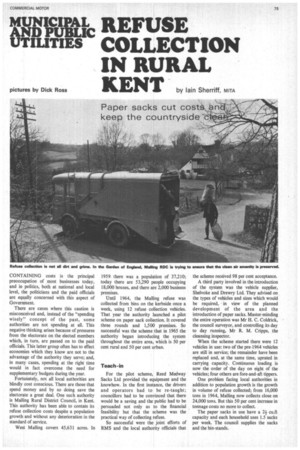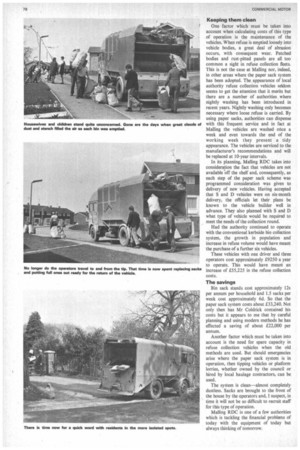CONTAINING costs is the principal preoccupation of most businesses today.
Page 77

Page 78

If you've noticed an error in this article please click here to report it so we can fix it.
and in politics, both at national and local level, the politicians and the paid officials are equally concerned with this aspect of Government.
There are cases where this caution is misconceived and, instead of the "spending wisely" concept of the past. some authorities are not spending at all. This negative thinking arises because of pressures from the electorate on the elected members which, in turn, are passed on to the paid officials. This latter group often has to effect economies which they know are not to the advantage of the authority they serve; and. in many cases, spending at the right time would in fact overcome the need for supplementary budgets during the year.
Fortunately, not all local authorities are blindly cost conscious. There are those that spend money and by so doing save the electorate a great deal. One such authority is Mailing Rural District Council, in Kent. This authority has been able to contain its refuse collection costs despite a population growth and without any deterioration in the standard of service.
West Mailing covers 45,631 acres. In 1959 there was a population of 37,210; today there are 53,290 people occupying 18,000 houses, and there arc 2,000 business premises.
Until 1964, the Mailing refuse was collected from bins on the kerbside once a week, using 12 refuse collection vehicles. That year the authority launched a pilot scheme on paper sack collection. It covered three rounds and 1,500 premises. So successful was the scheme that in 1965 the authority began introducing the system throughout the entire area, which is 50 per cent rural and 50 per cent urban.
Teach-in For the pilot scheme, Reed Medway Sacks Ltd provided the equipment and the knowhow. In the first instance, the drivers and operators had to be re-taught; councillors had to be convinced that there would be a saving and the public had to be persuaded not only as to the financial feasibility but that the scheme was the practical way of collecting refuse.
So successful were the joint efforts of RMS and the local authority officials that the scheme received 98 per cent acceptance.
A third party involved in the introduction of the system was the vehicle supplier, Shelvoke and Drewry Ltd. They advised on the types of vehicles and sizes which would be required, in view of the planned development of the area and the introduction of paper sacks. Master-minding the entire operation was Mr H. C. Coldrick, the council surveyor, and controlling its day to day running, Mr R. M. Cripps, the cleansing inspector.
When the scheme started there were 12 vehicles in use: two of the pre-1964 vehicles are still in service; the remainder have been replaced and, at the same time, uprated in carrying capacity. Continuous loading is now the order of the day on eight of the vehicles; four others are fore-and-aft tippers.
One problem facing local authorities in addition to population growth is the growth in volume of refuse collected; from 16,000 tons in 1964, Malling now collects close on 24,000 tons. But this 50 per cent increase in tonnage costs no more to collect.
The paper sacks in use have a 2+ cu.ft capacity and each household uses 1.5 sacks per week. The council supplies the sacks and the bin-stands.
Keeping them clean
One factor which must be taken into account when calculating costs of this type of operation is the maintenance of the vehicles. When refuse is emptied loosely into vehicle bodies, a great deal of abrasion occurs, with consequent wear. Patched bodies and rust-pitted panels are all too common a sight in refuse collection fleets. This is not the case at Mailing nor, indeed, in other areas where the paper sack system has been adopted. The appearance of local authority refuse collection vehicles seldom seems to get the attention that it merits but there are a number of authorities where nightly washing has been introduced in recent years. Nightly washing only becomes necessary where loose refuse is carried. By using paper sacks, authorities can dispense with this frequent service and • in fact at Mailing the vehicles are washed once a week and even towards the end of the working week they present a tidy appearance. The vehicles are serviced to the manufacturer's recommendations and will be replaced at 10-year intervals.
In its planning, Mailing RDC takes into consideration the fact that vehicles are not available off the shelf and, consequently, as each step of the paper sack scheme was programmed consideration was given to delivery of new vehicles. Having accepted• that S and D vehicles were on six-month delivery, the officials let their plans be known to the vehicle builder well in advance. They also planned with S and D what type of vehicle would be required to meet the needs of the collection round_
Had the authority continued to operate with the conventional kerbside bin collection system, the growth in population and increase in refuse volume would have meant the purchase of a further six vehicles.
These vehicles with one driver and three operators cost approximately £9250 a year to operate. This would have meant an increase of £55,225 in the refuse collection costs.
The savings Bin sack stands cost approximately 12s per annum per household and 1.5 sacks per week cost approximately 6d. So that the paper sack system costs about £33,240. Not only then has Mr Coldrick contained his costs but it appears to me that by careful planning and using modern methods he has effected a saving of about £22,000 per annum.
Another factor which must be taken into account is the need for spare capacity in refuse collection vehicles when the old methods are used But should emergencies arise where the paper sack system is in operation, then tipping vehicles or platform lorries, whether owned by the council or hired by local haulage contractors, can be used.
The system is clean—almost completely dustless. Sacks are brought to the front of the house by the operators and, I suspect, in time it will not be so difficult to recruit staff for this type of operation.
Mailing RDC is one of a few authorities which is tackling the financial problems of today with the equipment of today but always thinking of tomorrow.




























































































































































































